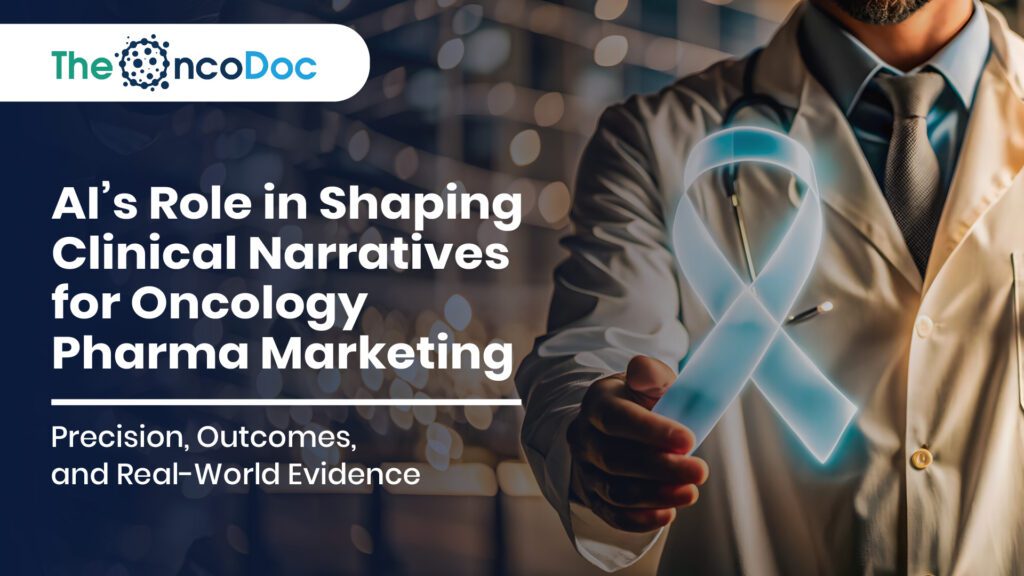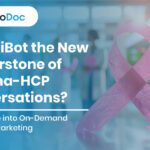Introduction: AI as the Bridge Between Science and Storytelling
Oncology is undergoing a technological revolution where artificial intelligence (AI) is not only transforming how cancer is diagnosed and treated but also redefining how therapies are marketed. For decades, pharma marketing primarily relied on clinical trial data to craft narratives for oncologists and healthcare providers. However, in today’s era of digital health and patient empowerment, this approach is no longer enough. Oncology marketing now demands credible, transparent, and evidence-backed narratives that resonate equally with oncologists, regulators, patients, and caregivers.
AI is emerging as the central tool in this evolution. By leveraging Real-World Evidence (RWE), predictive analytics, and biomarker-driven insights, AI empowers pharma companies to design hyper-personalized campaigns that communicate not just efficacy but patient-specific outcomes. Marketers can now tell stories grounded in data science, highlighting how therapies benefit real patients rather than anonymous cohorts.
This article explores how AI is shaping oncology marketing strategies through RWE-driven messaging, clinical trial optimization, predictive modeling, and biomarker discovery. It also outlines how pharma can leverage these AI-driven insights to enhance trust, personalize outreach, and build lasting engagement in one of the most competitive therapeutic landscapes.
1. From Data to Narrative: The Power of RWE in Oncology Marketing
Real-World Evidence (RWE) has become a cornerstone of oncology marketing, providing a more complete understanding of how therapies perform beyond clinical trial conditions. AI systems analyze large datasets from:
- Electronic Health Records (EHRs): Capturing detailed patient histories, comorbidities, and treatment outcomes.
- Patient Registries: Offering disease-specific insights into therapy adoption and survival trends.
- Insurance Claims Data: Revealing prescribing patterns and long-term therapy adherence.
- Wearable Device Outputs: Providing real-time health data to complement clinical endpoints.
By synthesizing these data sources, AI creates a 360-degree view of patient outcomes, empowering pharma companies to communicate narratives that reflect real-world therapeutic success rather than isolated trial data.
Example: Instead of promoting a therapy solely based on progression-free survival (PFS) from a clinical trial, a campaign could emphasize how AI-driven analysis of 50,000 real-world patients showed a 30% reduction in emergency hospitalizations over 12 months.
This evidence-rich messaging builds credibility with oncologists and confidence among patients, reducing skepticism around promotional claims.
2. AI-Optimized Clinical Trial Design for Marketing Impact
Clinical trials remain the gold standard for regulatory approval, but their relevance in marketing has often been limited by rigid inclusion criteria and narrow patient demographics. AI is changing this paradigm by making trial design more inclusive, predictive, and market-ready.
How AI Transforms Trial Strategy:
- Patient Recruitment Optimization:
To find patients who are most likely to respond to treatment, AI models search genomic databases and EHRs. This reduces recruitment time by up to 30% while ensuring a trial population that better reflects the diversity of real-world patients. - Adaptive Trial Designs:
AI continuously analyzes trial data, enabling protocol adjustments based on early signals. If certain biomarkers show strong efficacy correlations, trial arms can be optimized in real time. - Predictive Site Selection:
AI predicts which trial sites will have the highest recruitment success based on past enrollment performance, reducing operational delays.
By streamlining trial design and execution, AI produces stronger, marketable data faster. Campaigns built on AI-enhanced trials resonate with both healthcare providers and patients because they reflect diverse populations and real-world scenarios.
3. Personalization Through Predictive Patient Outcome Modeling
Traditional marketing often focused on broad efficacy claims, but today’s oncology landscape demands personalized messaging that highlights therapy benefits at the individual level. AI-driven predictive models leverage genomic, proteomic, and imaging data to forecast:
- Individual response likelihood to specific therapies.
- Potential side-effect profiles and how they can be managed.
- Long-term survival probabilities and quality-of-life improvements.
For oncologists, this information helps them make data-backed treatment decisions, while for patients, it delivers a sense of security knowing their treatment journey is supported by precision analytics. Marketing campaigns that emphasize these predictions create a sense of hope without overpromising, improving both trust and adoption rates.
4. Biomarker Discovery: Transforming Messaging Around Precision Oncology
Biomarker discovery is one of AI’s most significant contributions to oncology. Pharma brands can now highlight therapies designed for specific molecular profiles rather than broad cancer types. This precision-first narrative is appealing to oncologists, who increasingly rely on biomarkers to choose treatment plans.
For example, if AI identifies a biomarker predicting resistance to standard chemotherapy, pharma marketers can position their therapy as an essential option for that patient subset, demonstrating not just innovation but life-saving potential.
In marketing content, AI-discovered biomarkers create narratives that emphasize scientific credibility and individualized care, strengthening relationships with oncologists and increasing payer support for targeted therapies.
5. AI-Powered Medical Writing and Content Generation
Creating regulatory-compliant, evidence-based marketing content is labor-intensive. AI now supports natural language generation (NLG) to draft patient stories, HCP brochures, and campaign material that:
- Aligns with regulatory requirements by referencing validated studies.
- Personalizes content based on geography, patient demographics, and treatment stage.
- Reduces time-to-market by automating data-to-narrative workflows.
Instead of generic marketing copy, campaigns now include dynamic messaging that adapts in real-time based on user interaction, search history, or physician specialty.
6. Hyperlocal Marketing Through AI-Driven Segmentation
AI-driven segmentation allows pharma marketers to tailor campaigns regionally. Oncology prevalence varies widely across geographies, with certain cancers more dominant in rural vs. urban populations. AI integrates geospatial health data, social determinants of health, and screening statistics to deliver micro-targeted campaigns.
This approach ensures that a breast cancer awareness campaign in Mumbai focuses on urban women’s lifestyle risks, while oral cancer prevention campaigns in rural Maharashtra emphasize tobacco cessation education. AI allows brands to speak the language of local communities, building stronger engagement.
7. Storytelling Through AI-Backed Evidence
Oncology pharma marketing has traditionally struggled with overcoming distrust from both physicians and patients, largely due to perceived overpromotion. AI-driven storytelling combats this skepticism by grounding every claim in traceable datasets.
For example:
- A social media campaign promoting a new immunotherapy might highlight that AI-analyzed registry data from 15,000 patients revealed improved survival outcomes.
- Infographics for oncologists can display AI-predicted adverse event profiles, improving transparency and positioning the pharma brand as a knowledge partner rather than a sales entity.
This evidence-first storytelling creates a bridge between science and marketing, fostering trust.
8. Real-Time Campaign Optimization with AI Analytics
Unlike traditional campaigns, which are static, AI enables real-time optimization of oncology marketing efforts:
- Sentiment Analysis: AI scans patient forums, physician portals, and social media for feedback, allowing rapid adjustments in tone and messaging.
- Engagement Metrics: AI measures not just clicks but meaningful engagement like time spent on educational videos or referrals to screening centers.
- Geo-Targeted Alerts: When an area shows increased searches for cancer symptoms, campaigns can be rapidly deployed to increase screening awareness.
Pharma marketers can now pivot strategies in days rather than months, ensuring maximum relevance and efficiency.
9. Ethical and Regulatory Considerations in AI-Driven Marketing
While AI offers unprecedented opportunities, oncology marketing must remain ethically grounded:
- Transparency in Data Use: Patients must understand how their anonymized data informs campaigns.
- Compliance with Global Standards: Marketing teams must align with HIPAA, GDPR, and regional regulatory guidelines.
- Bias Mitigation: AI systems must be monitored to ensure equitable marketing messages across demographic groups.
Building trust through ethical AI practices will be as important as the campaigns themselves.
10. The Future of AI-Driven Oncology Marketing: Digital Twins and Beyond
AI is laying the foundation for the next frontier in oncology marketing:
- Digital Twins: Virtual patient avatars simulate disease progression and therapy outcomes, enabling clinicians and patients to visualize personalized treatment journeys.
- Emotion-Centric Marketing: AI analyzes patient emotions in real time to deliver compassionate, supportive messaging that reduces fear and promotes adherence.
- Predictive Awareness Campaigns: Instead of reactive campaigns, AI will predict rising cancer cases in certain demographics, enabling preventive marketing.
This evolution ensures oncology marketing is not about products but about saving lives through awareness and precision engagement.
11. AI-Enhanced Multilingual Marketing for Diverse Populations
Global oncology campaigns often fail to resonate because they are created in a single language or cultural framework. AI-powered translation and sentiment analysis tools allow marketers to create emotionally intelligent multilingual campaigns.
For example, a breast cancer campaign in India could feature Hindi, Bengali, and Tamil content with localized cultural references. This personalization ensures that cancer awareness crosses language barriers, fostering inclusivity and trust.
12. Precision Market Access and Payer Communication
Market access teams often face challenges convincing payers to reimburse oncology therapies due to high costs. AI simplifies this by generating payer-focused dossiers that highlight cost-effectiveness, long-term savings, and real-world benefits. By integrating health economics data with predictive outcomes, pharma companies craft narratives that resonate not just with oncologists but also insurance providers, driving faster reimbursement approvals.
13. AI-Driven Video Marketing with Emotional Intelligence
Video remains one of the most engaging formats in oncology marketing, and AI is elevating its effectiveness. Advanced tools now analyze viewer behavior, including micro-expressions, watch time, and emotional responses, to refine scripts, visuals, and tone. This allows campaigns to adapt dynamically, presenting uplifting, supportive content for patients while delivering in-depth, data-driven insights to healthcare professionals. By tailoring messaging in real time to audience sentiment, pharma brands achieve higher engagement, stronger emotional connection, and greater trust. AI-driven video storytelling ensures that every frame resonates, transforming videos into impactful tools for awareness, education, and patient empowerment.
14. Virtual Advisory Boards with AI Insights
AI is modernizing medical advisory boards by integrating predictive analytics and RWE dashboards. Instead of static slide decks, oncologists can interact with real-time simulations of treatment effectiveness based on global patient data. These insights shape not only clinical decisions but also marketing narratives, demonstrating pharma’s role as a knowledge leader.
15. AI-Powered Survivor Support and Post-Treatment Engagement
Oncology marketing extends beyond treatment completion, focusing on the long-term well-being of survivors. AI-driven platforms monitor health data, track recovery milestones, and provide personalized alerts for follow-up care. They also deliver emotional wellness resources, virtual counseling, and tailored lifestyle recommendations to help patients regain confidence and improve quality of life. By maintaining consistent communication and offering proactive support, pharma companies strengthen their role as trusted health partners rather than just drug providers. These initiatives build lasting relationships, encourage treatment adherence, and position brands as advocates for survivorship, ultimately enhancing trust and loyalty in the oncology ecosystem.
Conclusion
Artificial intelligence has evolved from a technical tool into a strategic storyteller for oncology pharma marketing. Its ability to analyze real-world evidence, optimize clinical trials, discover biomarkers, and predict outcomes is transforming marketing into a science-driven, patient-first discipline.
Pharma companies no longer compete solely on efficacy claims; they compete on trust, personalization, and demonstrated patient impact. AI bridges this gap by:
- Offering transparent narratives supported by live data.
- Helping marketers tailor outreach at every level, from molecular biomarkers to regional culture.
- Streamlining content generation and campaign execution, reducing time-to-market.
- Enhancing payer relationships by emphasizing value-driven care.
Looking ahead, AI will bring even greater innovations, such as digital twins that simulate personalized cancer journeys, predictive models for early intervention campaigns, and emotion-aware content that builds confidence rather than fear. The future of oncology marketing is not transactional, it is a blend of precision science, empathy, and patient empowerment, made possible through AI’s intelligence and scalability.
Pharma brands that embrace AI holistically will not only sell therapies but also shape the future of cancer care, ensuring that every campaign is more than a promotion, it’s a life-saving conversation backed by data and compassion.
The Oncodoc team is a group of passionate healthcare and marketing professionals dedicated to delivering accurate, engaging, and impactful content. With expertise across medical research, digital strategy, and clinical communication, the team focuses on empowering healthcare professionals and patients alike. Through evidence-based insights and innovative storytelling, Hidoc aims to bridge the gap between medicine and digital engagement, promoting wellness and informed decision-making.



